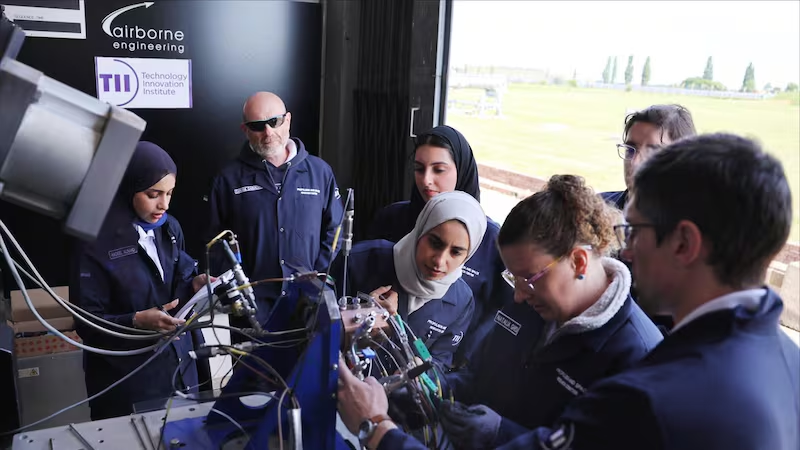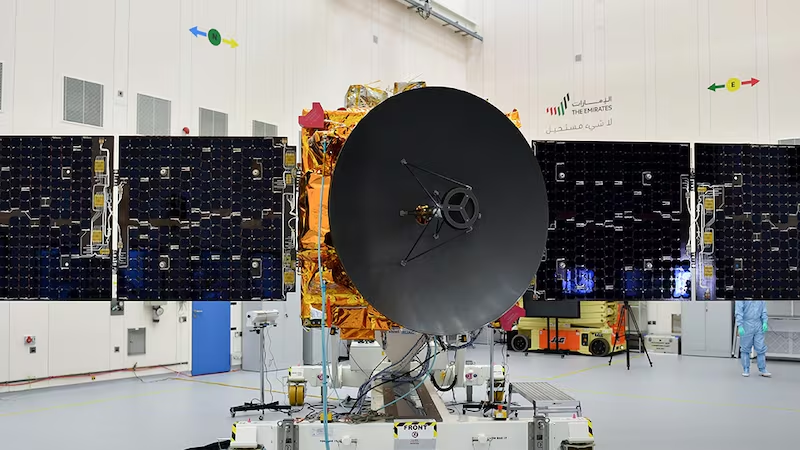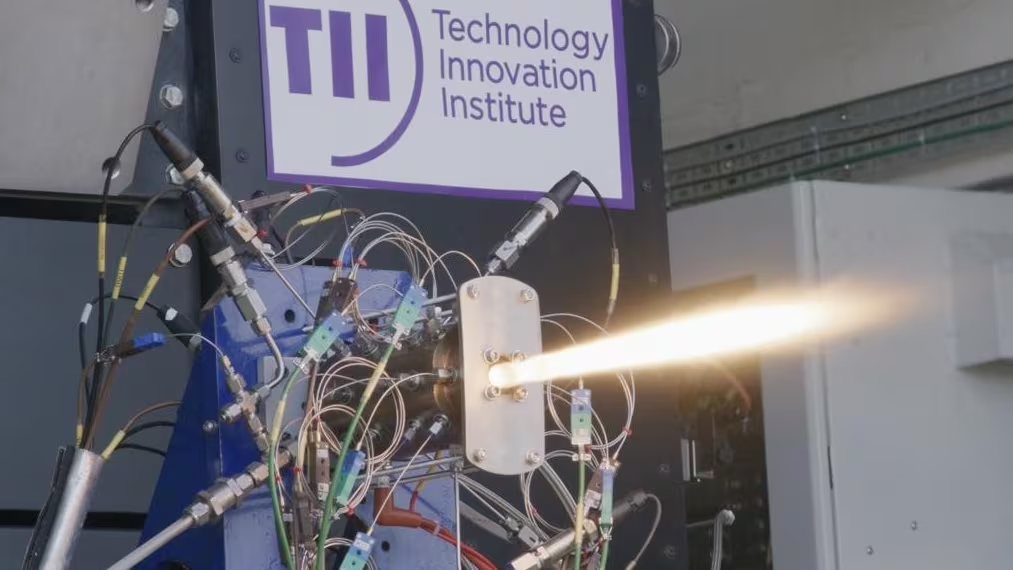Abu Dhabi rocket engine test Mars mission marks a significant step forward for the United Arab Emirates’ space ambitions. In a groundbreaking achievement, researchers in Abu Dhabi have successfully test-fired a domestically developed liquid rocket engine. This milestone reflects the UAE’s growing capabilities in space technology and highlights the nation’s potential to play a key role in future interplanetary missions including missions to Mars.
The achievement is a result of years of meticulous planning, research, and development by a team of dedicated engineers and scientists. The successful test demonstrates that the UAE is not only capable of participating in global space exploration but can also develop indigenous technology that is vital for deep space missions. The test-firing represents a major milestone in the UAE’s journey toward becoming a self-reliant spacefaring nation.
A Homegrown Technological Achievement
The rocket engine that was successfully tested in Abu Dhabi is a liquid-fueled thruster capable of producing significant thrust for small scale spacecraft. The engine was designed, built, and tested entirely within the UAE, showcasing the country’s commitment to advancing its own space capabilities without relying on foreign technology.

Liquid rocket engines are crucial for modern space missions. They allow spacecraft to perform precise orbital maneuvers, adjust trajectories, and maintain their position in space. This level of control is essential for missions targeting distant celestial bodies including Mars. Developing this technology domestically ensures that the UAE has the capability to design future missions according to its own vision and timelines.
The development of a liquid rocket engine involves overcoming complex engineering challenges. The design must ensure efficient fuel combustion, reliable ignition, and consistent thrust while operating under extreme temperatures and pressures. Achieving this level of precision requires sophisticated testing facilities and rigorous experimentation. Abu Dhabi’s successful test demonstrates that the UAE now has the necessary technical expertise and infrastructure to meet these challenges.

Overcoming Technical Challenges
Designing and testing a rocket engine is an enormous engineering challenge. One of the key obstacles faced by the team was the need to create a secure and efficient testing environment. Engineers had to develop custom test rigs capable of safely handling high pressure fuel and intense heat generated during the firing process.
The team conducted dozens of controlled test firings to evaluate the engine’s performance under different operating conditions. Each firing provided valuable data that helped refine the engine’s design and ensure maximum reliability. The process also allowed researchers to address any potential safety concerns before scaling up the technology for larger spacecraft.
The successful test-firing was the culmination of months of iterative work. Engineers had to carefully balance multiple factors, including fuel flow, chamber pressure, and nozzle design, to achieve the desired thrust. Every aspect of the engine had to be meticulously engineered to prevent failure, which could result in costly setbacks or damage to the testing facilities.
Strategic Importance of the Rocket Engine Test
The Abu Dhabi rocket engine test is not only a technological triumph but also a strategic milestone for the UAE. Developing indigenous propulsion technology reduces dependence on foreign expertise, giving the nation more control over its space program. This autonomy is critical for planning complex missions, such as interplanetary travel or lunar landings, which require precise engineering and timing.
A domestic rocket engine capability allows the UAE to participate in international space projects as a more independent partner. It also opens the door for future collaborations with other nations and private space companies. By building its own technology, the UAE can contribute more meaningfully to joint missions and scientific endeavors, enhancing its global standing in the space exploration community.
The test also has economic and educational benefits. It demonstrates that the UAE can invest in high tech industries and create opportunities for local talent in aerospace engineering and related fields. Training engineers and scientists to develop advanced propulsion systems contributes to a knowledge based economy and positions the country as a hub for innovation in the region.

Advancing the UAE’s Mars Exploration Goals
The UAE has set ambitious goals for Mars exploration. The successful deployment of the Hope probe in 2021, which successfully entered Mars’ orbit, was a major milestone that demonstrated the nation’s capability in deep space missions. The recent rocket engine test builds on that achievement, ensuring that the UAE can continue developing technology for future Mars missions, including potential landers, rovers, or even sample return missions.
Accurate and reliable propulsion is essential for interplanetary travel. Spacecraft traveling to Mars must navigate vast distances with extreme precision to ensure they arrive in orbit or land at designated sites. By mastering liquid rocket technology, the UAE ensures that it can design spacecraft capable of performing complex maneuvers, adjusting trajectories mid flight, and landing safely on another planet.
In addition to Mars, the UAE’s propulsion capabilities will benefit other space missions, including satellite deployment and deep space exploration. The technology can support missions to the Moon, asteroids, or other planets in the solar system, paving the way for a sustained presence in space.
Building a Sustainable Space Program
The successful test is part of a broader effort to build a sustainable space program in the UAE. Developing indigenous technologies allows the country to maintain long term capabilities without depending on international partners for critical components. This is particularly important as space missions become more complex and require advanced systems that may not be readily available abroad.
By investing in research, testing facilities, and local talent, the UAE is laying the foundation for a robust space ecosystem. Engineers trained on projects like the liquid rocket engine will gain experience that can be applied to future missions. Similarly, the knowledge gained from these tests will feed into the design of larger engines capable of lifting heavier spacecraft or supporting interplanetary missions.
The UAE’s approach to space exploration emphasizes sustainability and long term planning. By developing its own technology and expertise, the nation can participate in multiple missions simultaneously and maintain flexibility in its space endeavors. This approach ensures that the UAE will remain competitive in the global space sector for decades to come.
Inspiring a New Generation
Beyond the technical and strategic benefits, the rocket engine test also serves as a source of inspiration for young scientists and engineers in the UAE and across the region. Seeing their country achieve breakthroughs in space technology motivates students to pursue careers in STEM fields and contributes to a culture of innovation.
The UAE has invested heavily in education and training programs to prepare the next generation of scientists, engineers, and space explorers. Projects like the liquid rocket engine test provide tangible examples of what can be achieved through dedication, teamwork, and technical skill. These achievements encourage students to dream big and aspire to contribute to global space exploration.
Furthermore, public engagement in space achievements fosters national pride and reinforces the importance of scientific research. The success of the rocket engine test sends a message that the UAE is capable of achieving technological milestones on par with other spacefaring nations.

Looking Ahead
The successful test-firing of the Abu Dhabi rocket engine is just the beginning. Future plans involve scaling up propulsion systems to support larger spacecraft and more ambitious missions. Engineers will continue refining the technology, improving efficiency, and ensuring that engines can operate reliably in the harsh conditions of space.
Long term goals include developing engines capable of supporting crewed missions and interplanetary exploration. The UAE aims to establish a sustained presence on Mars and other celestial bodies, which requires reliable propulsion, advanced spacecraft design, and extensive research in space sciences.
The UAE’s space program also aims to contribute to global scientific knowledge. Missions enabled by domestic rocket engines can carry scientific instruments to study planetary atmospheres, geology, and potential signs of life. These contributions not only advance the UAE’s position in space exploration but also benefit the broader scientific community.
Conclusion
Abu Dhabi’s successful rocket engine test represents a historic achievement for the UAE’s space ambitions. It demonstrates that the nation has the technical expertise, infrastructure, and vision to develop advanced propulsion systems capable of supporting future Mars missions and other deep space endeavors.
This milestone is a testament to the dedication and skill of the researchers and engineers who made it possible. It also reflects the UAE’s broader commitment to building a sustainable, knowledge based space program that can contribute to global exploration efforts.
By mastering liquid rocket technology, the UAE is taking an important step toward achieving its long term goals in space exploration. The successful test opens the door for more complex missions, inspires a new generation of scientists and engineers, and positions the nation as a key player in the rapidly evolving global space sector.
Abu Dhabi rocket engine test Mars mission is more than just a technical achievement. It is a symbol of ambition, innovation, and determination. The UAE is now firmly on the path toward becoming a leading force in space exploration, ready to contribute to humanity’s understanding of the cosmos and to inspire generations to come.
Do follow UAE Stories on Instagram
Read Next – Sheikh Mohammed Pays Tribute to Sheikh Rashid on 35th Anniversary














